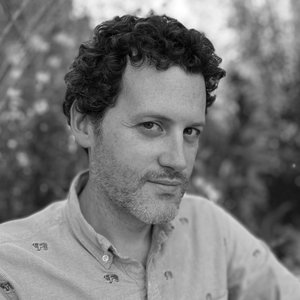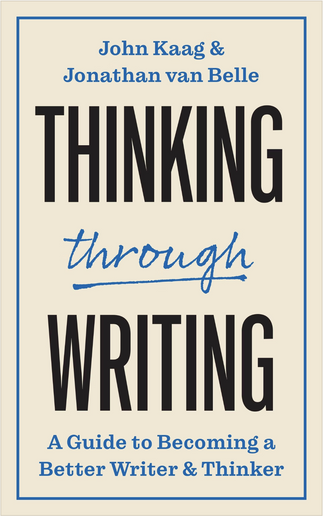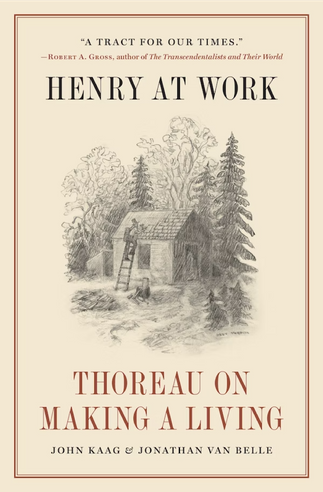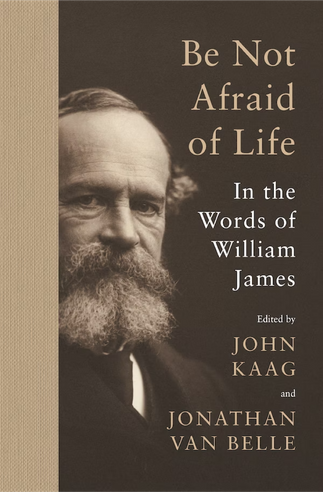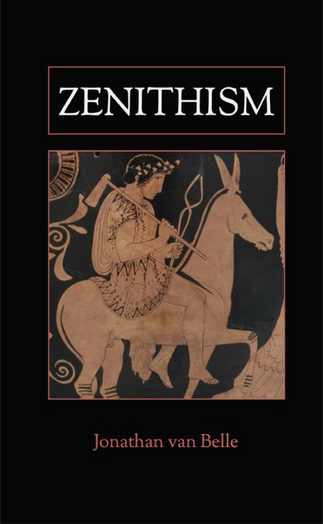Jonathan van Belle
Author and Independent Scholar
Thinking through Writing:
A Guide to Becoming a Better Writer and Thinker
“One of the great strengths of the book is its knowledgeable-but-cheeky tone. It lends the authors enormous credibility when offering advice and solace and will help keep student readers on their toes rather than checking out of reading a dry textbook.”
—Lisa Horton, University of Minnesota Duluth
For college students learning how to write on scholarly subjects, writing and critical thinking go hand in hand. And yet most books on these topics are categorized separately: writing guides and critical thinking handbooks. This book is different, offering a manual for developing reading, writing, and thinking skills in tandem. With short, practical chapters,Thinking through Writinghelps readers learn to think critically about themselves and the world at large, read carefully and get the necessary literary support, write clearly and persuasively, stay on point, and finish their work as cleanly and compellingly as possible. Drawing on years of teaching critical thinking and writing, including almost a decade of teaching Harvard’s freshman expository writing course, the authors invite readers to consider the intimate relationship between thinking and the creative, critical, self-actualizing act of writing.
• Interviews with some of the most interesting and brilliant writers working today
• Advice on how to structure an argument, write for an audience, work through writer’s block and anxiety, and much more
• Tips on how to make your writing unique and personal
• Exercises and templates to help novice writers reach their full potential in practice
Henry at Work:
Thoreau on Making a Living
“This is a necessary book. It recovers the true Thoreau, who, far from the loafer of many accounts, was the most practical of all our philosophers. He worked hard, and he also thought about why he was working, an American Buddha with a hammer and a hoe. This book should correct our history and reintroduce many to one of its greatest figures.”
—Bill McKibben, author of The End of Nature
Henry at Work invites readers to rethink how we work today by exploring an aspect of Henry David Thoreau that has often been overlooked: Thoreau the worker. John Kaag and Jonathan van Belle overturn the popular misconception of Thoreau as a navel-gazing recluse who was scornful of work and other mundanities. In fact, Thoreau worked hard—surveying land, running his family’s pencil-making business, writing, lecturing, and building his cabin at Walden Pond—and thought intensely about work in its many dimensions. And his ideas about work have much to teach us in an age of remote work and automation, when many people are reconsidering what kind of working lives they want to have.
Through Thoreau, readers will discover a philosophy of work in the office, factory, lumber mill, and grocery store, and reflect on the rhythms of the workday, the joys and risks of resigning oneself to work, the dubious promises of labor-saving technology, and that most vital and eternal of philosophical questions, “How much do I get paid?” In ten chapters, including “Manual Work,” “Machine Work,” and “Meaningless Work,” this personal, urgent, practical, and compassionate book introduces readers to their new favorite coworker: Henry David Thoreau.
Be Not Afraid of Life:
In the Words of William James
“Want to get to know William James, America’s most-beloved—and perhaps most widely influential—philosopher? This wonderful collection gives us James at his best—provocative, lyrical, inspirational. Whether you are meeting James in an easy chair, in a classroom, or on a ‘ramble,’ as James called the mountain hikes he loved, the encounter will leave you richly rewarded.”
—James T. Kloppenberg, Harvard University
William James—psychologist, philosopher, and spiritual seeker—is one of those rare writers who can speak directly and powerfully to anyone about life’s meaning and worth, and whose ideas change not only how people think but how they live. The thinker who helped found the philosophy of pragmatism and inspire Alcoholics Anonymous, James famously asked, “is life worth living?” Bringing together many of his best and most popular essays, talks, and other writings, this anthology presents James’s answer to that and other existential questions, in his own unique manner—caring, humorous, eloquent, incisive, humble, and forever on the trail of the “ever not quite.”
Here we meet a James perfectly attuned to the concerns of today—one who argues for human freedom, articulates a healthy-minded psychology, urges us to explore the stream of consciousness, presents a new definition of truth based on its practical consequences, and never forecloses the possibility of mystical transcendence. Introduced by John Kaag and Jonathan van Belle, these compelling and accessible selections reveal why James is one of the great guides to the business of living.
Zenithism
“Jonathan van Belle is a genial and engaged guide. He leads us through little-known byways to novel heights—and we gaze with rapture upon dazzling mindscapes of higher thought. The man seems to have read everything. His browsable compendium is likely to change the way you see the world.”
— Rudy Rucker, author of Infinity and the Mind and The Ware Tetralogy
Zenithism is the prospect that an infinite natural system evolves infinitely many maximally advanced conscious beings.
Zenithism, the first book on the subject, examines zenithist philosophy through essays, aphorisms, short stories, and a Grecian dialogue. This mixed-genre work is an invitation to explore the eschatological possibilities of science, technology, and nature.

